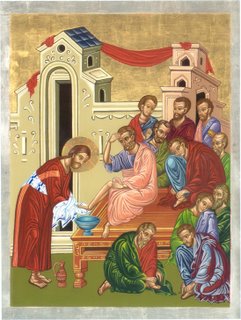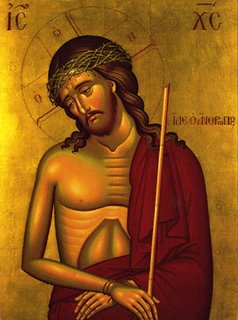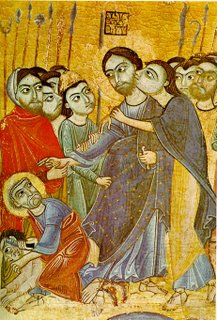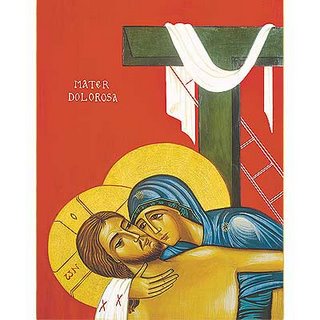 Maundy Thursday
Maundy ThursdayLove is an obsession of humanity. So what is it? Is it the eewie goowie feelings of a first kiss? Is it unbridled sensuality? Is it finding that someone who ‘completes us?’ As Jerry Mcguire might say?
Mother Teresa said “love is a fruit that is always in season.” To what is she referring? Is it the weird way in which 21st century Americans meet to “try out” another person or to gratify a desire? Or is love something else? When Scripture says that “God is love,” what does that mean? Maybe we should consult our gospel tonight to see what love is.
What is taking place here in John 13? Why is this night different from other nights? It was just before Passover, the night before Jesus was to be crucified. Passover was a time to remember. It was a time to look back when Israel was in bondage to Egypt and God miraculously delivered them. In the famous Exodus story, God struck down the firstborn of every family in Egypt, his final of several terrible plagues. That fateful night, the only families who were spared were those who had killed an unblemished lamb and applied the blood of that lamb on their doorposts. The angel of death “passed over” those houses protected by the blood of the slain lamb. Incidentally, this is why Episcopal Churches have red doors. This is a place of safety and sanctuary.
It was for this Passover, records John, that Jesus came. Remember the words of John the Baptist, “Behold the Lamb of God, who takes away the sins of the world.” Jesus had full knowledge that it was his hour to become the Lamb of God. He knew his betrayer was in his midst, yet he wanted to show his disciples the full extent of his love. I cannot imagine the agony he must have felt knowing the brutal treatment he was about to receive. Nor can I understand why he would want to show love to a group of men who would all soon abandon him.
Jesus answered our questions about love by showing that love is manifest in and through humility. Our gospel says Jesus knew “that the Father had given all things into his hands.” So, if he knew this, what did he do? Did he display his power by destroying the Romans? Did he display his power by forcing his disciples to declare him as King? No. He got up and wrapped a towel around his waist and began to wash his disciples feet. As you probably know, foot washing in 1st century Palestine whether you be Jewish, Greek or Roman, was reserved for the slaves of the household. It was a menial, degrading task. Remember the words of John the Baptist when he refers to Jesus as the one who comes after him, “the thongs of whose sandals I am not worthy to untie.” John was referring to foot washing. He felt he was not even worthy to be a slave to Jesus. So what was Jesus doing? The one who had all things under his power, made himself a slave to show is love for his disciples. The King of kings and Lord of lords became a slave to show his love to his disciples. He showed that love is manifested by humility and selflessness, not selfishness and pride.
Next Christ shows us that before we can love, we must first be loved. Peter could not understand why Jesus was humiliating himself so. Peter saw this act of humility as a sign of weakness and rightly so. He says, “Lord, you shall never wash my feet!” but Jesus felt it was imperative to show that Peter must first be served before it was possible for him to serve. We can see how difficult it must have been for Peter to accept this kind of love. It is often easier to be the one who is giving the care rather than the one receiving the care. Sometimes we think we are junior messiahs and try so hard to give ourselves to others. We do not realize that we too need help, like Peter.
As long as I’ve been coming to Maundy Thursday services, there is always someone who is freaked out by the whole idea of footwashing in the first place. I remember one Lent I was in a basketball league and I wore shoes that were too small one game. When you wear shoes that are too small you get what athletes call ‘purple toe.’ So guess what my feet looked like that Maundy Thursday?
Footwashing is an embarrassing and vulnerable kind of thing. Peter felt that it was degrading for Jesus. He was embarrassed for him. Peter did not want to receive such an act of love and humility. But Jesus insisted. Because Jesus wanted to love him like no one else could.
When someone loves you deeply, they see all of your weaknesses and those things that are ugly, those things you would rather not have others see—yet they love you anyway.
That’s what the love of Jesus is like. Those who know his love know that he loves totally and without condition. Someone might say, “That’s all well and good, but you don’t know the kind of life I’ve led, or the things I’ve done.” But God does not love us–not because of what we do but in spite of it. Through Christ, we are forgiven and loved. The Lamb of God who takes away the sins of the world—has taken away your sins and mine. Indeed we have been loved.
Next, Jesus shows us that since we have been loved , we should in turn love others. Today is Maundy Thursday. Can anyone tell me what “Maundy” means? “Maundy” is the Latin word meaning “commandment.” After washing his disciples feet, Jesus says, “I give you a new commandment, that you love one another—just as I have loved you, you should also love one another.” This “new commandment” puts the Maundy in Maundy Thursday. Christ wants us to love as he loved. He wants us to relinquish our rights just as he did his. To love as Christ loved, we relinquish our right to think we are better than anyone else: we do things no one else wants to do, we go where no one else wants to go. We love even when the other person does not deserve it.
Could you imagine what our lives would look like if we loved in this way? Could you imagine your relationship with your loved ones if you all committed to love selflessly the way Christ did–putting others first? Could you imagine our church if we all committed to put everyone else’s needs above our own? Could you imagine your marriage if both spouses committed to putting the other before themselves?
Love as Christ loved–do the things no one else wants to do, go places no one else wants to go. Put others first, whether they deserve it or not.
Lastly, for the truest example of love, there is no greater love than that which Jesus displayed on the cross—which is what this week, and our faith is all about.
John 13:1 says that Jesus showed the full extent of his love—he loved then to the last, he loved them completely. The act of foot washing was only a foretaste of what Jesus was to do on a horrible cross of wood the next day. There is no greater love than love Christ displayed by dying for these disciples that he calls friends. These disciples who all abandoned him only a few hours after he washed their feet. The Romans and the Sanhedrin who had him put to death, at least they didn’t know him—but his friends abandoned him in his greatest hour of need. And he died for them.
Why? Why would he die for those who denied and abandoned him?
We know we have abandoned and denied him too. It is so easy to make sin and evil something ‘out there,’ something that others do to helpless victims or something others do to us. But as our bishop recently remarked, ‘sin’s face is always the most familiar.’ That face is our own. We live with ourselves everyday—we know what is in our minds, we know what is in our hearts, we know what our true intentions are. We know we “haven’t loved God with our whole hearts and we haven’t loved our neighbors as ourselves.” Why would he die for us?
Because he loves us—not because of what we do but in spite of it. No matter how unlovely or unlovable we think we are, he loves us. no matter how unlovely or unlovable you think you are, he loves you.
Richard Neuhaus says, “from the beginning God knew what he would do about a humanity he created free to love him, and therefore free to hate him...From the beginning ‘God was in Christ reconciling the world to Himself.’ This is what it means to love; this is what it means to be love; this is what it means to say that God is love...What was separated by an abyss of wrong has been reconciled by the deed of perfect love.”
So-what is love? Love is not a selfish feeling. Love is not an emotion. Love is not using others for our own needs and gratification. Love is none of these things. Love is doing the things no one else wants to do, going the places no one else wants to go; putting others first, whether they deserve it or not.
Love is a towel. And a basin. It is a cross of wood. Three nails. And a crown of thorns.









